This website uses cookies so that we can provide you with the best user experience possible. Cookie information is stored in your browser and performs functions such as recognising you when you return to our website and helping our team to understand which sections of the website you find most interesting and useful.
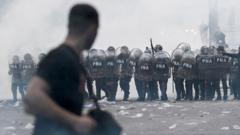
6 hours ago
By Jaroslav Lukiv, George Wright, BBC News
Argentina's Senate has narrowly approved President Javier Milei's controversial economic reform package, with the vote taking place as violent clashes raged between protesters and riot police outside Congress.
Demonstrators in Buenos Aires - who say the measures will hurt millions of Argentines - threw petrol bombs and stones, setting cars alight.
A number of people were reported injured, with local media describing the scene on Wednesday as a "battlefield".
The reforms, aimed at reviving the country's flagging economy, include declaring a state of economic emergency, cutting pensions and watering down labour rights.
Mr Milei, a right-wing economist, was elected in the midst of a deep economic crisis which he is still struggling to stem after six months in office.
Annual inflation is currently close to 300%, while more than half of Argentines are now living in poverty.
Mr Milei's "shock" measures are opposed by leftist political parties, labour unions and social organisations.
But the motion, which was initially tied 36-36 in the Senate, was preliminarily passed on Wednesday after the head of the chamber, Vice-President Victoria Villarruel, broke the tie.
"For those Argentines who suffer, who wait, who do not want to see their children leave the country... my vote is affirmative," Ms Villaruel said after breaking the tie.
The 328-article bill will now be surveyed point by point before its expected full approval on Thursday.
It will then return to the lower house for the final go-ahead.
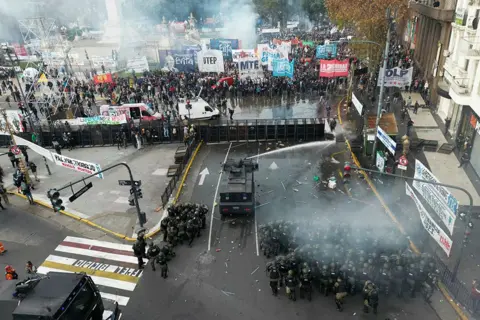 AFP
AFP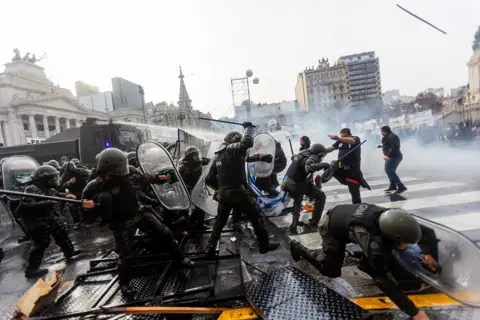 AFP
AFP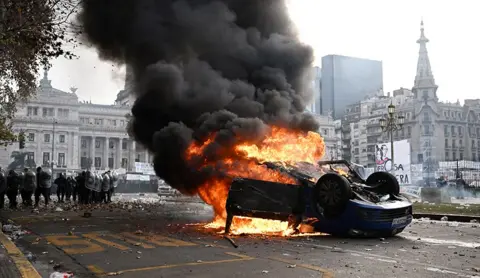 AFP
AFPAhead of the bill's passing in the Senate, protesters chanted: “The country is not for sale, the country is defended," while one banner read: “how can a head of state hate the state?”
Scuffles broke out when protesters tried to make their way towards Congress through fences, with demonstrators throwing rocks at officers who pepper sprayed them.
Observers and opposition MPs said dozens of demonstrators and a handful of MPs received medical attention. At least five opposition MPs in the crowd were hospitalised, legislator Cecilia Moreau told AFP news agency.
At least 20 police officers were also injured, officials said. Security forces said they arrested 15 people.
"We cannot believe that in Argentina we are discussing a law that will put us back 100 years," Fabio Nunez, a 55-year-old protesting lawyer, was quoted by AFP as saying.
President Milei's office issued a statement thanking the security forces for repressing what it described as "terrorists" attempting to carry out a coup d'état.
“We are going to change Argentina, we are going to make it the most liberal country in the world," Mr Milei told a conference in Buenos Aires.
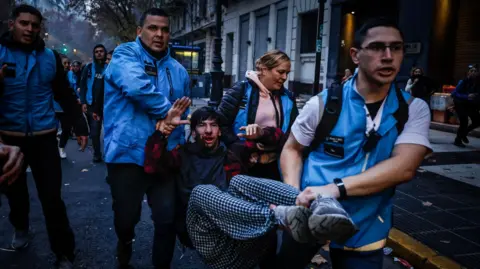 EPA
EPAThe highly divisive bill was approved by the lower house in April, after significant amendments were made to it.
Mr Milei came to office in 2023 after vowing to take a chainsaw to public spending.
While on the campaign trail, he even brandished a chainsaw while making a speech to symbolise his determination to do so.
He has since cut the cabinet in half, slashed 50,000 public jobs, suspended new public works contracts and ripped away fuel and transport subsidies.



 Africana55 Radio
Africana55 Radio 

